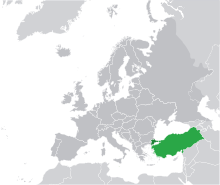LGBTQ rights in Turkey | |
|---|---|
 | |
| Status | Decriminalised in 1858 |
| Gender identity | Gender reassignment surgery legal since 1988 |
| Military | No, LGBT people are not allowed to serve openly |
| Discrimination protections | No, constitutional protection proposed but never enacted (see below) |
| Family rights | |
| Recognition of relationships | No recognition of same-sex relationships |
| Adoption | No |
| Part of a series on |
| LGBTQ rights |
|---|
 |
| Lesbian ∙ Gay ∙ Bisexual ∙ Transgender ∙ Queer |
|
|
Lesbian, gay, bisexual, transgender, and queer (LGBTQ) people in Turkey face legal challenges not experienced by non-LGBTQ residents, though the overall situation is considered to be less repressive when compared to most other Muslim-majority countries.[1]
In 1858, the Ottoman Empire—the predecessor of the modern-day Republic of Turkey—adopted a new penal code, which no longer contained any explicit articles criminalizing homosexuality, sodomy, and köçeklik (young male slave dancers). The Ottoman Penal Code of 1858 was heavily influenced by the Napoleonic Code, as part of wider reforms during the Tanzimat period.[2] LGBTQ people have had the right to seek asylum in Turkey under the Geneva Convention since 1951,[3] but same-sex couples are not given the same legal protections available to heterosexual couples. Transgender people have been allowed to change their legal gender since 1988. Although discrimination protections regarding sexual orientation and gender identity or expression have been debated legally, they have not yet been legislated.
In 2013, ILGA-Europe ranked Turkey 39th out of 49 countries regarding the protection of LGBTQ rights, but in 2024, it fell to the 47th position, followed only by Azerbaijan and Russia.[4]
- ^ "What LGBTQ travelers need to know about Turkey".
- ^ Ishtiaq Hussain (15 February 2011). "The Tanzimat: Secular Reforms in the Ottoman Empire" (PDF). Faith Matters. Archived (PDF) from the original on 17 October 2016. Retrieved 5 December 2014.
- ^ "islam and homosexuality". 11 November 2015. Archived from the original on 25 October 2015. Retrieved 2 November 2015.
- ^ "Rainbow Map".